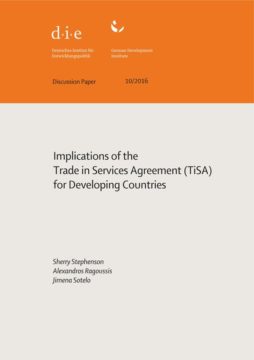Although the level of ambition shared in negotiations for the Trade in Services Agreement (TiSA) is high, one of the biggest fears is that the agreement will negatively impact on third countries that are either excluded or unwilling to participate. This paper highlights the issues in the negotiations that are most relevant to them and analyses direct and indirect channels of potential impact of the agreement on non-participants. We argue that the most substantial impact of TiSA on developing countries will likely come indirectly from the high regulatory standards that will need to be met by all services exporters, including third countries in trade agreements with TiSA members, as well as through the diversion of investment flows and global value chain operations to the TiSA area. We show that accession may represent a notable challenge for many emerging economies due to the high degree of regulatory heterogeneity between them and TiSA participants. However, we argue that there are ways of making the agreement more development-friendly. By adding chapters with a development focus and linking the implementation of TiSA to the WTO-led Aid for Trade Initiative, among other recommendations, negotiators would go a long way towards making the agreement more appealing to developing countries.
- Veröffentlicht am Samstag 14. Dezember 2024 von Deutsches Institut f. Entwicklungspolitik
- ISBN: 9783889856890
- 49 Seiten
- Genre: Gesellschaft, Politik, Sachbücher, Volkswirtschaft, Wirtschaft
